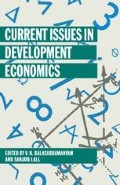Abstract
Conventional wisdom has it that international trade is driven by inter-country differences in factor endowments or factor productivity. The former is formalised in the celebrated Heckscher—Ohlin—Samuelson Theorem (HOS), the latter in the equally important (but less influential) Ricardian Theorem. Although these theorems are often discussed in general terms, one senses from the literature a presumption that they are particularly applicable to explaining the trade flows of less developed countries (LDCs). It can be readily seen why this presumption emerges. After all, many LDCs depend heavily on exports of primary products which tend to be natural resource-based. Moreover, some empirical evidence suggests that the trade flows of LDCs, particularly north—south trade flows, are driven by differences in factor endowments or factor productivity, (see for instance Learner, 1981).
Preview
Unable to display preview. Download preview PDF.
Editor information
Editors and Affiliations
Copyright information
© 1991 Macmillan Publishers Limited
About this chapter
Cite this chapter
Greenaway, D. (1991). New Trade Theories and Developing Countries. In: Balasubramanyam, V.N., Lall, S. (eds) Current Issues in Development Economics. Current Issues in Economics. Palgrave, London. https://doi.org/10.1007/978-1-349-21587-4_8
Download citation
DOI: https://doi.org/10.1007/978-1-349-21587-4_8
Publisher Name: Palgrave, London
Print ISBN: 978-0-333-51324-8
Online ISBN: 978-1-349-21587-4
eBook Packages: Palgrave Economics & Finance CollectionEconomics and Finance (R0)

